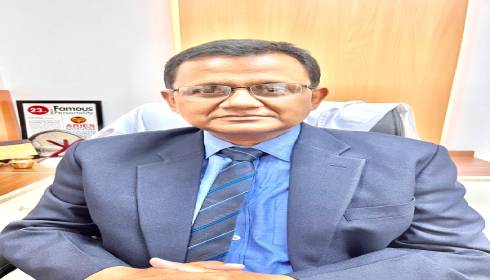
Delhi: Rare fecal microbiota transplant saves 78-year-old's life
Rohit Shishodia
Doctors at Delhi’s Sir Ganga Ram Hospital (SGRH) have saved the life of a 78-year-old patient, suffering from ulcers in the large intestine, by carrying out Fecal Microbiota Transplant (FMT), a process of transferring faecal bacteria and other microbes from a healthy individual.
Treating doctors informed that there are two ways of administering it; the first method is to give it through the nose by using a tube and the other method is to put it in by using colonoscopy, which is an easier method and was used in this case.
The microbiota in the transplanted faecal matter replaces bad bacteria in the patient and may take multiple sessions.
According to SGRH, the patient was suffering from ulcerative colitis and had been diagnosed with Pseudomembranous colitis (PMC), swelling or inflammation of the large intestine (colon) due to an overgrowth of Clostridioides difficile (C difficile) bacteria, a common cause of diarrhoea after antibiotic use.
The patient’s condition relapsed even after two courses of standard treatment for PMC. So he was offered treatment with FMT.
The patient was admitted in a very sick condition with fever, bloody diarrhoea, low blood pressure, hypotension and tachycardia (high heart rate).
His stool examination showed persistence of C. Difficle (a bad bacteria) causing Pseudomembranous Colitis (ulcers in the large intestine) leading to persistent diarrhoea with bleeding.
Dr Piyush Ranjan, Vice-Chairperson, Institute of Liver Gastroenterology and Pancreatico Biliary Sciences, SGRH, said, “The only viable option for this disease was to take stool from a healthy person and transplant in the large intestine of the patient. This leads to increase in good bacteria in the intestine and suppression of C. difficle.”
“We have done FMT earlier for severe alcoholic hepatitis not responding to steroids or having side effects of steroids and ulcerative colitis. This is the rare case of a patient being treated with recurrent PMC treated with FMT in our country,” Dr Ranjan added.
the patient started responding to treatment two days after performing FMT and his clinical condition improved. The patient was discharged subsequently and is doing well at two months of follow up.
“Human intestine harbours billions of bacteria which are collectively referred to as the gut microbiome,” Dr Ranjan explained.
These bacteria play an active role in maintaining human health and there are a number of diseases which arise from imbalance of gut bacteria. A state of disbalance between the good bacteria and harmful bacteria is referred to as dysbiosis.
One of the important ways by which these bacteria influence health and disease are by modulating the immune response of the body.
They affect both innate immunity, which is the reaction of the body to a foreign antigen when the body is exposed to it for the first time and also adaptive immunity.
“Pseudomembranous Colitis” (PMC) is a condition when a harmful bacteria called Clostridium difficle starts multiplying faster. This is a known side effect of prolonged antibiotic intake. This effect is modulated by suppression of “Good bacteria” in our gut. This condition usually affects elderly and people on prolonged antibiotic therapy, chemotherapy or immunosuppressive medications,” Dr Ranjan explained.
“Symptoms of patients are diarrhoea, blood in stool, fever and pain in the abdomen. This condition can be severe and at times in susceptible individuals may be recurrent in as high as 30% patients,” Dr Ranjan added.
He pointed out that the initial treatment of this condition is an oral antibiotic called vancomycin, which is effective in nearly three-quarters of patients. In case of recurrent infections, there are other medical options.
Dr Ranjan elaborated that in patients who have relapses beyond the second episode, FMT remains the best treatment option.